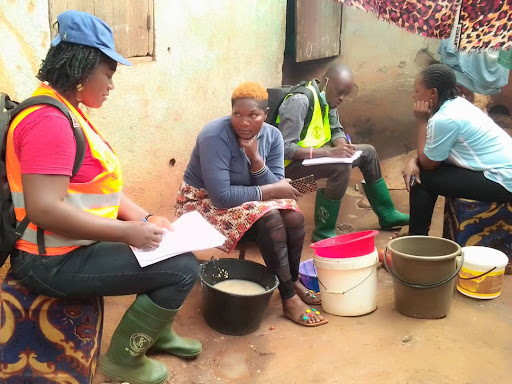Over 90% Of Displaced People In Cameroon Say They Get No Assistance
The government of Cameroon says it gives humanitarian aid to displaced people from the two Anglophone regions living in Douala and Bonaberi. But the overwhelming majority say they received nothing, a new survey has found.

Almost all the people displaced by the Anglophone crisis in Cameroon living in two major towns say they have not received any humanitarian aid, and feel angry and abandoned, according to a new survey.
For two months, the Lodge An IDP Association, carried out a door-to-door research to gather information on internally displaced persons, from the Northwest and Southwest regions, now residing in the Littoral and West regions of the country.
Fonyuy Fotsing, co-founder of the LAI, said that while collecting data among internally displaced people in need of urgent help in the Littoral and West regions, survey takers found attitudes are hardening.
Government forces have been battling separatists who want to build a new state from the two English -speaking regions of Cameroon.
The seven-year war has forced over 628,000 people to flee their homes according to the United Nations.
‘Nursing hate’
The government has promised that displaced people would be helped, and held public displays to demonstrate that they are handing over aid to those in need.
It says that the situation is being “well managed”.
But when LAI went to meet the needy where they lived, they found many of those displaced are “nursing hate” against organisations who initially came collecting data from their families and promised to offer help, and were never seen again, Fotsing said.
“It’s true there have been so many interventions by the state, and other individuals, for these persons,” Fosting said, “most of the times when there’s assistance for these persons, those who benefit are not the real vulnerable IDPs because they pass through quarter heads to locate IDPs. Instead of giving names of right persons in need, they take names of relatives and friends and send them forth.”
In Bafoussam, the main town of the West region, which is close to the Northwest region where the war is taking place, the organisation talked to 2,230 households and discovered that 2,097 of them would be classed as “vulnerable”. This number of households amounts to a total of 13,499 individual IDPs.
Out of the 2,097 households interviewed between November to December, just 206, less than 10 per cent, said they had received any form of assistance from any organisation.
Out of those 206 who said they received assistance before, some said they got it from humanitarian organisations, some from the government and the rest from individuals from the host community.
It is a similar case with Bonaberi, a popular community inhabited by Anglophones in the Littoral region. The research shows that of the 1,932 households interviewed, only 191 said they got some assistance from an organisation.
“Majority of those in need are not included. This is why we decided to take authorization from local authorities and go directly into the quarters and carry out a door-to-door search. We didn’t consult anyone for a list. That’s the difference,” Fotsing added.
Hungry
For two years, Namata and his family have been collecting bags of rice, koki beans and oil from a local organisation as an IDP in Buea, Southwest. Though from a poor background, he acknowledged that his connections helped him to get listed.
“I am also hungry. It’s not just about IDPs. I am poor and hungry so I should be collecting these things,” he said.
Fotsing’s research showed water, sanitation and hygiene, education, documentation, feeding, health, and financial sustainability are some of the areas that need immediate assistance in order to ameliorate living conditions of internally displaced persons.
In 2018 President Paul Biya launched an 18-month special assistance plan for IDPs and victims of abuses in the English Speaking regions. A commision was created to raise and handle these funds.
The government has said that talk of a humanitarian crisis is overblown, manipulated by their critics.
Government minister Paul Atanga Nji, reportedly said: “No, there is no humanitarian crisis in Cameroon, the situation is under control and it is well managed.”
Support Our Journalism
There are millions of ordinary people affected by conflict in Africa whose stories are missing in the mainstream media. HumAngle is determined to tell those challenging and under-reported stories, hoping that the people impacted by these conflicts will find the safety and security they deserve.
To ensure that we continue to provide public service coverage, we have a small favour to ask you. We want you to be part of our journalistic endeavour by contributing a token to us.
Your donation will further promote a robust, free, and independent media.
Donate HereStay Closer To The Stories That Matter




